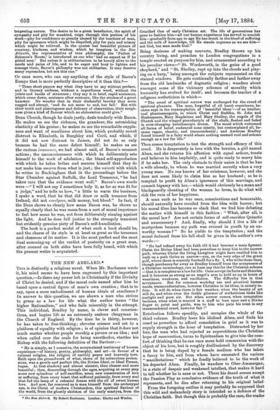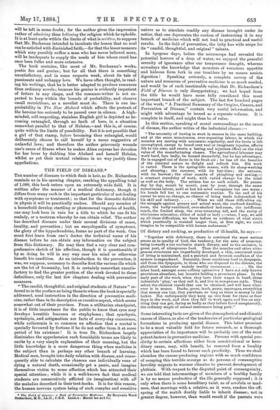THE NEW ABELLIRD.*
THIS is distinctly a religious novel. When Mr. Buchanan wrote it, his mind seems to have been engrossed by this important question,—Is there any power left in Christianity if the Divinity of Christ be denied, and if the moral code named after him be
based upon a central figure of man's own creation ; that is to say, upon a mere embodiment of human ideals of excellence ?
In answer to this question, we are shown a man who strives to grasp as a law for life what the author terms "the higher Rationalism," and who fails miserably in the attempt. This individual, Bradley by name, is clever and conscien- tious, and begins life as an extremely zealous clergyman in the Church of England. By the time he is thirty, however, he has taken to free-thinking ; elevates science and art to a platform of equality with religion ; is of opinion that it does not much matter whether people worship a person or an idea ; and -when called over the coals for being unorthodox, startles his Bishop with the following definition of the Saviour:—
" He is simply, as I conceive, the accumulated testimony of human experience—of history, poetry, philosophy, and art—in favour of a rational religion, the religion of earthly peace and heavenly love. Built upon the groundwork of what, shorn of its miraculous preten- sions, was a gentle and perfect life, the Divine Ideal, or Ideal Person, began. At first shadowy and almost sinister, then clearer and more beautiful ; then, descending through the ages, acquiring at every step some new splendour of self-sacrifice, some new consecration of love or suffering, from every heart that suffered patiently, from every soul that fed the lamp of a celestial dream with the oil of sweet human love. And now, far removed as is man himself from the archetypal ape, is the Christ of modern Christendom, this spiritual Saviour of the world, from the ghostly skeleton of the early martyrs, from the • The Nem Actor& By Robert Buchanan. London ; Ohatto and Windns.
Crucified One of early Christian art. The life of generations has gone to fashion him—all our human experience has served to nourish him—gradually from age to age He has drunk in the blood of suffering and the milk of knowledge, till He stands supreme as we see him— not God, bat man made God."
Being desirous of making converts, Bradley throws up his country living, and preaches to London congregations in a temple erected on purpose for him, and ornamented according to his peculiar views—" St. Wordsworth, in the guise of a good shepherd," and "St. Shelley, rapt up into the clouds and play- ing on a harp," being amongst the subjects represented on the stained windows. He gets continually farther and farther away from the old landmarks of dogmatic religion ; wanders about amongst some of the visionary schemes of morality which humanity has evolved for itself; and becomes the teacher of a religious wstheticism in which-
" The creed of spiritual sorrow was exchanged for the creed of spiritual pleasure. The man, forgetful of all harsh experience, be- came rapt in the contemplation of beautiful ideas'—of an intellec- tual phantasmagoria, in which Christ and Buddha, St. John and Shakespeare, Mary Magdalene and Mary Shelley, the angels of the Church and the winged pterodactyls of the chalk, flashed and faded in ever-changing kaleidoscopic dream. The mood which welcomed all forms of belief, embraced none utterly, but contemplated all, be- came vague, chaotic, and transcendental ; and Ambrose Bradley found himself in a fairy world where nothing seemed real and solemn enough as a law for life."
Then comes temptation to test the strength and efficacy of this creed. He is desperately in love with the heroine, a girl named Alma, and she returns his affection with equal ardour, trusts and believes in him implicitly, and is quite ready to marry him if he asks her. The only obstacle to their union is that he has a wife already, to whom he was married secretly when a very young man. No one knows of her existence, however, and she does not seem likely to claim him as her husband ; so he is tempted to profit by Alma's ignorance of this marriage, and commit bigamy with her,—which would obviously be a mean and blackguardly cheating of the woman he loves, to do what will risk the ruin of her happiness.
A man such as he was once, conscientious and honourable, should naturally have recoiled from the idea with horror; but his moral fibre has become so slack that we find him debating the matter with himself in this fashion : "What, after all, is the moral law ? Are not certain forms of self-sacrifice Quixotic and unnecessary ? And, finally, why should I live a life of martyrdom because my path was crossed in youth by an un- worthy woman ? " So he yields to the temptation ; and the moral deduced from his fall shall be given in the author's own words :—
"He had refined away his faith till it had become a mere figment. Christ the Divine Ideal had been powerless to keep him to the narrow path, whereas Christ the living Lawgiver might have enabled him to walk on a path thrice as narrow—yea, on the very edge of the great gulf, where there is scarcely foothold for a fly. I, who write these lines, though perchance far away as Bradley himself from the acceptance of a Christian terminology, can at least say this for the Christian scheme —that it is complete as a law for life. Once accept its facts and theories, and it becomes as strong as an angel's arm to hold us up in hours of weariness, weakness, and vacillation. The difficulty lies in that acceptance. But for common workday use and practical human needs, transcendentalism, however Christian in its ideas, is utterly in- firm. It will do when there is fair weather, when the beauty of art will do, and when even the feeble glimmer of a3stheticism looks like sunlight and pure air. But when sorrow comes, when temptation beckons, when what is wanted is a staff to lean upon and a Divine finger to point and guide, woe to him who puts his trust in any transcendental creed, however fair !"
Retribution follows speedily, and occupies the whole of the third volume: Bradley loses his idolised Alma, and finds his
creed as powerless to afford consolation in grief as it was to supply strength in the hour of temptation. Distracted by her loss, the man who had rejected as superstitious the Christian hope of resurrection, turns to Spiritualism to give him the com- fort of thinking that be can once more hold communion with the object of his love, but is roughly disillusioned by the discovery that he is being duped by a female medium who has taken a fancy to him, and from whom have emanated the various " manifestations " which he fondly believed to be the work of his departed Alma. Finally, he wanders to Ober-Ammergau, in a state of despair and weakened intellect, that makes it hard to tell whether he is sane or not. There his dazed senses accept the Passion Play as conclusive evidence of the truth of what it represents, and he dies after returning to his original belief. From the foregoing outline it may probably be supposed that this wild and melancholy story is intended as a defence of the Christian faith. But though this is probably the case, the reader will be left in some doubt; for the author gives the impression rather of admiring than believing the religion which he upholds. It is at least quite within the limits of what is written, to suppose that Mr. Buchanan intended to inculcate the lesson that no soul can be satisfied with diminished faith,—for that the lessermeasnre which may possibly suffice a man who has never believed more, will be inadequate to supply the needs of him whose creed has once been fuller and more extensive.
The book contains, like most of Mr. Buchanan's works, poetic fire and genius ; but for all that there is something unsatisfactory, and in some respects weak, about its tale of passionate and unhappy love. We have often thought, in read- ing his writings, that he is better adapted to produce romances than ordinary novels ; because his genius is evidently impatient of fetters in any shape, and the romance-writer is not ex- pected to keep within the bounds of probability, and observe small restrictions, as a novelist must do. There is one im- probability in The New Abelard which affects the portrait of the heroine too seriously to be passed over in silence. A high- minded, self-respecting, stainless English girl is depicted as be- coming entangled, through no fault of hers, in a situation somewhat parallel to that of HeloIse,—and this is, of course, quite within the limits of possibility. But it is not possible that a girl of that stamp, before becoming thus entangled, would deliberately choose to call herself by a name suggestive of unlawful love; and therefore the author grievously wounds one's sense of fitness when he makes Alma express her devotion for her lover by dubbing him Abelard and herself Heloise, whilst as yet their mutual relations in no way justify these appellations.



































 Previous page
Previous page